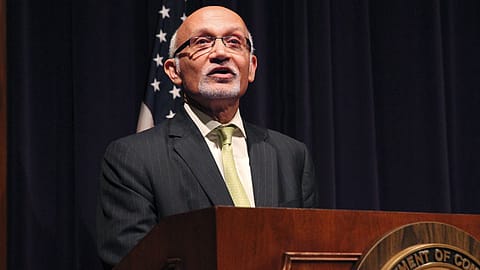"U.S.-India ties will survive the regime change."
A former Tata Administrative Services officer and entrepreneur, and the author of a book of poetry, Arun M. Kumar holds a vital portfolio in the Department of Commerce under the Obama administration. As the Obama years wind down, Kumar says India will continue to be a priority for U.S. trade policy—no matter which way the American voters swing in the coming polls.

ARUN M. KUMAR leads the trade and investment push of the U.S. government as assistant secretary of commerce, Global Markets, and secretary general, U.S. and Foreign Commercial Service. He also spearheads advocacy for better market access for U.S. exporters through the International Trade Administration’s offices in over 70 global markets.
Kumar studied physics in Kerala and earned an MBA from the Sloan School of Management. Before joining the Obama administration, he founded and led consulting giant KPMG’s U.S.-India practice, as well as a clutch of tech startups in Silicon Valley. He is also the author of Plain Truths, a book of poetry, and co-editor of Kerala’s Economy: Crouching Tigers, Sacred Cows. Kumar spoke to Fortune India about the importance of teaching liberal arts and the rising stock of India’s competitive federalism. Edited excerpts:
What were your early thoughts when the U.S. Senate ratified your appointment to this role in 2014?
It was a great honour. When you are in the private sector, you think government processes are slow and cumbersome. You don’t realise what a busy place the government is. In the months of conversation that preceded my formally joining this team, I thought a lot about priorities. All around the world there’s a lot of build-out in infrastructure, power, transportation. All of this is a big opportunity for U.S. businesses, increasing U.S. exports, and improving market access for American companies. So that was going to be a big focus.
You also work with small businesses.
Yes. Small businesses are a very dynamic part of the economy in the U.S. as they are in India. Their exports have grown faster than exports overall. U.S. regulations say that every major new law should be examined for its impact on small businesses and should take their views on board. I have a Silicon Valley perspective and believe e-commerce will change the world. So we help small businesses use e-commerce channels to export more.
What were some of President Obama’s personal goals?
Increasing business with Africa and building the Trans-Pacific Partnership have been two big thrusts. Africa was underserved; the U.S.-Africa Business Forum has doubled its footprint in Sub-Saharan Africa.
U.S. commerce secretary Penny Pritzker had told Fortune she wanted to make the department more open. Has that happened?
For both the president and the secretary, making government data public was a key goal, and a huge amount of data has been made accessible. Separately, the secretary said data science should be brought into commerce so that businesses can figure out what competitive advantages they need to harness or what kind of [export items] they should focus on. Data is transformational.
What’s your assessment of India under Narendra Modi?
We applaud the Prime Minister’s focus on ease of doing business. It’s also a good thing that more power is being devolved to the states. Competitive federalism is a great idea, and it’s pleasing to see India going in that direction. Personally, I am excited about the growth of startups. Cross-border startups can fuel the U.S.-India connection significantly. Overall, India is a top priority at the policy level. After I got here, we developed a strategic and commercial dialogue between the U.S. secretary of commerce and secretary of state and their Indian counterparts. The idea is very much that we need to reflect each other’s goals. For instance, as part of the dialogue, we now have a workstream dedicated to ease of doing business. We constantly share best practices. We also have a workstream on innovation and entrepreneurship.
There’s a regime change imminent in Washington D.C. How will it impact the ties between the two countries?
The U.S.-India relationship is mature and will survive change. It can tolerate a few ups and downs. Within the administration there are strong professionals who carry programmes forward from one government to another. I am confident the agenda of collaboration will continue.
You have an eclectic résumé. Who have been the main influences?
My father was a big influence. He created a need to aspire and achieve. Then I had great teachers in high school who shaped my choice of reading. Again, at the University College in Thiruvananthapuram, I had fantastic teachers. [The late educationist and author] B. Hridayakumari taught us English. We also had the late economist K.N. Raj, who played a big role in shaping the [now defunct] Planning Commission. I was also a national science scholar. Early on I learnt that literature and economics [and science] are basically different ways to interpret the world.
How was it to work with Ratan Tata at the beginning of your career?
As a part of the Tata Administrative Services cadre, I was fortunate to work with him directly. I have always been impressed by his elevated thinking. He believed anything was possible. The real lesson from his career is one of courage, of going against established thinking.